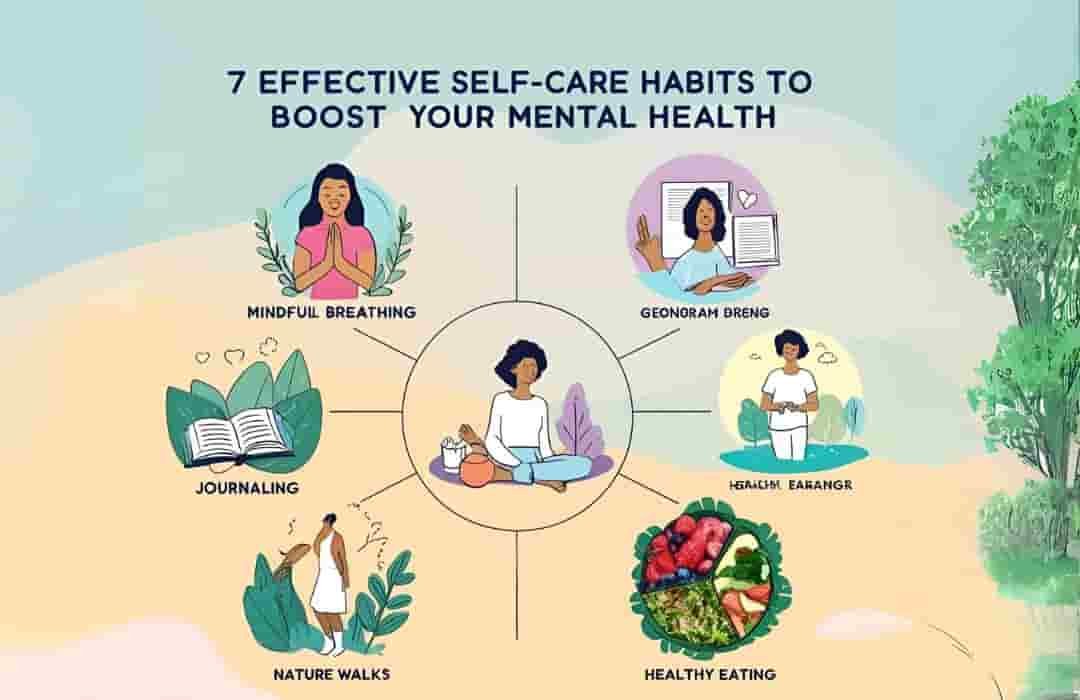Mental health has become a crucial topic in recent years and for a good reason. As we navigate the demands of daily life, it’s easy to overlook our emotional well-being. However, prioritizing mental health is just as important as maintaining physical health. One of the most effective ways to do this is by cultivating positive self-care habits. This article will explore self-care strategies that can help you improve your mental health, reduce stress, and build resilience for life’s challenges. Whether you’re looking for practical tips or seeking a deeper understanding of how self-care can enhance your mental well-being, this article has you covered.

Why Self-Care Matters for Mental Health
Before diving into specific self-care habits, let’s address why self-care is so important for mental health. Self-care is not just about pampering yourself or indulging in luxuries—it’s about taking intentional actions that nurture your mind and body. These actions help reduce stress, combat burnout, and foster emotional resilience. When we practice self-care, we make it possible to better cope with challenges, whether they are personal, professional, or health-related.
By incorporating self-care into your routine, you’re essentially giving your mind and body the tools to recharge, leading to increased focus, better emotional regulation, and a stronger sense of well-being. In the long run, these habits will also boost your overall quality of life, helping you thrive instead of just surviving.
1. Develop a Mindfulness Practice
Mindfulness is a powerful tool to help you stay present and calm. It allows you to focus on the moment without judgment, helping you to distance yourself from overwhelming thoughts and worries. The practice of mindfulness has been shown to reduce symptoms of anxiety, depression, and stress, all of which are linked to poor mental health.
How to practice mindfulness:
- Meditation: Set aside time each day to meditate. Start with five minutes and gradually increase the duration. Use a quiet space and focus on your breath or a mantra to centre your thoughts.
- Mindful breathing: When you feel overwhelmed, try mindful breathing exercises. Inhale slowly through your nose for a count of four, hold for four, then exhale through your mouth for a count of four. Repeat several times.
- Mindful walking: Go for a walk in nature and focus on the sights, sounds, and sensations around you. This simple activity can help calm your mind and refresh your energy.
By regularly practising mindfulness, you’ll notice a significant improvement in your ability to manage stress and your overall mental health.
2. Prioritize Sleep and Rest
Adequate sleep is one of the most important factors for mental health. Sleep is not just about rest—it’s the time your brain uses to repair, consolidate memories, and regulate emotions. Poor sleep can lead to irritability, difficulty concentrating, and an increased risk of anxiety and depression.
Tips for better sleep:
- Set a routine: Try to go to bed and wake up at the same time every day. This helps regulate your body’s internal clock.
- Create a calming bedtime environment: Limit screen time before bed, dim the lights, and create a peaceful space that promotes relaxation.
- Avoid stimulants: Stay away from caffeine and heavy meals close to bedtime, as they can interfere with your ability to fall asleep.
When you prioritize rest, you’re giving your brain and body the recovery time they need to function at their best. This is an essential self-care habit for boosting mental health.
3. Engage in Regular Physical Activity
Exercise is not only beneficial for your physical health but also for your mental well-being. When you exercise, your body releases endorphins—chemicals in the brain that act as natural mood boosters. Regular physical activity helps reduce anxiety, alleviate symptoms of depression, and improve your overall mood.
Ways to incorporate physical activity into your routine:
- Find an activity you enjoy: Whether it’s yoga, jogging, swimming, or dancing, choose an exercise you love. When you enjoy the activity, you’re more likely to stick with it.
- Start small: If you’re new to exercising, begin with short sessions and gradually increase the intensity and duration as you feel more comfortable.
- Make it social: Exercising with friends or family can make the experience more enjoyable. Consider taking a walk or attending a fitness class together.
Even a 20-minute walk each day can have a profound impact on your mental health, helping you feel more energized, focused, and less stressed.
4. Practice Gratitude
Gratitude is a simple yet effective practice for improving mental health. It involves focusing on the positive aspects of life, no matter how small. Research has shown that cultivating gratitude can increase happiness, reduce feelings of depression, and improve overall mental well-being.
How to practice gratitude:
- Gratitude journaling: At the end of each day, write down three things you’re grateful for. This can be anything from a good cup of coffee to a positive interaction with a colleague.
- Express gratitude to others: Take time to thank those who have positively impacted your life, whether it’s through a note, a message, or a simple conversation.
- Shift your perspective: Whenever you’re feeling down, try to reframe the situation by focusing on what you can be grateful for. This helps you focus on the positives rather than the negatives.
By practising gratitude regularly, you train your brain to focus on the good, leading to improved mental clarity and emotional health.
5. Set Boundaries to Protect Your Mental Health
One of the most overlooked self-care habits is setting boundaries. Whether it’s at work, in relationships, or in social settings, knowing when to say no is essential for maintaining mental health. Boundaries allow you to protect your energy and ensure that you’re not overwhelmed or overcommitted.
How to set boundaries:
- Know your limits: Understand your emotional, physical, and mental limits. Recognize when you’re stretched too thin and take steps to prioritize yourself.
- Communicate clearly: Be honest and assertive when setting boundaries. For example, if you’re feeling overwhelmed at work, communicate with your supervisor about your workload.
- Prioritize self-care: Set aside time for yourself, even if it means saying no to invitations or extra responsibilities. This time is essential for your mental well-being.
Setting healthy boundaries allows you to protect your emotional energy and focus on the things that matter most for your mental health.
6. Build and Maintain Meaningful Relationships
Human connection is vital for mental health. Having supportive relationships with friends, family, or colleagues can help you navigate challenges and provide emotional support during difficult times. Building and nurturing these relationships is a key part of self-care.
Tips for maintaining healthy relationships:
- Communicate openly: Make time to talk to loved ones about your thoughts and feelings. Healthy communication strengthens relationships and prevents misunderstandings.
- Spend quality time together: Whether it’s a coffee date with a friend or a family movie night, prioritize quality time with those who uplift you.
- Seek support when needed: Don’t hesitate to lean on others during tough times. Reaching out for support is a sign of strength, not weakness.
By cultivating meaningful relationships, you surround yourself with positive influences that contribute to your emotional health and overall well-being.
7. Take Time to Unplug and Disconnect
In today’s digital world, it’s easy to get caught up in the constant buzz of notifications, emails, and social media. While technology can enhance our lives in many ways, it can also be overwhelming and draining. Taking regular breaks from technology is crucial for maintaining mental health.
How to disconnect:
- Set digital detox times: Designate certain times of the day or week to unplug from all devices. This could be an hour before bed or a whole day on the weekend.
- Practice mindfulness without technology: Engage in activities that don’t involve screens, such as reading a book, taking a walk, or enjoying a hobby.
- Limit social media use: If social media causes stress or anxiety, set boundaries on how much time you spend scrolling each day.
By unplugging from technology, you allow your mind to rest and recharge, helping you stay mentally balanced and focused.
Conclusion: Make Self-Care a Priority for Better Mental Health
Taking care of your mental health isn’t a one-time event—it’s an ongoing process. By integrating these self-care habits into your routine, you’ll create a foundation of emotional resilience that will help you navigate life’s ups and downs with confidence. Remember, mental health is just as important as physical health, and it deserves your attention and care.
Start small, be consistent, and most importantly, be kind to yourself. Mental health is a journey, and every positive action you take brings you closer to a happier, healthier you.
What self-care habit will you implement today? Start small, and let us know how it goes!
By embracing these self-care strategies, you’ll be well on your way to boosting your mental health, fostering emotional balance, and living a more fulfilling life. Take the first step today, and watch how your well-being improves over time!






